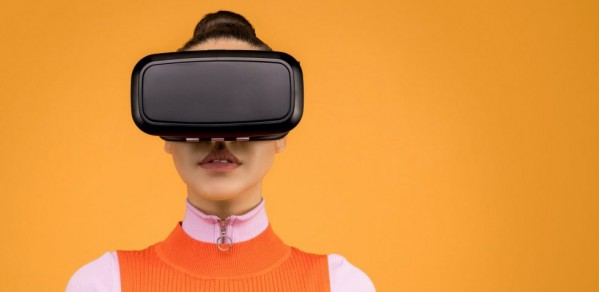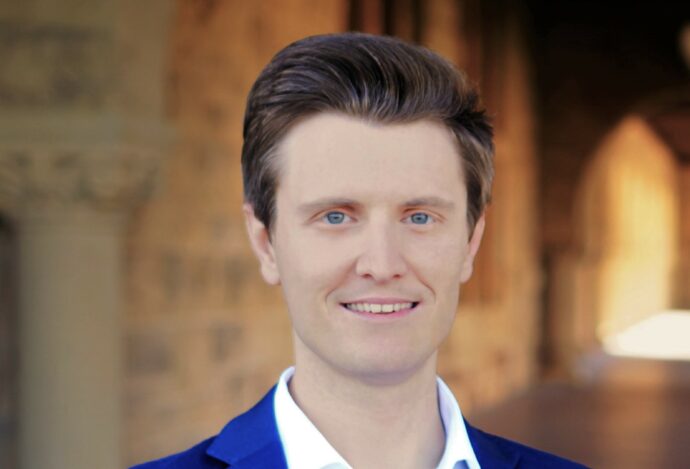
Dr Matteo Zallio describes himself as an inclusive design activist. He is a visiting research fellow at the Department of Engineering. Below he explains some of the different aspects of his research, and why he has felt compelled to help establish a new field of research, 'Metavethics': The ethics of the metaverse.
Forecasts predict that by 2026 a quarter of the population will spend at least an hour a day in the metaverse. Ensuring that such experiences are accessible, inclusive and safe for users of all abilities is critical.
Dr Matteo Zallio
In the future not only physical environments will have to be inclusive and accessible, but also digital, virtual and immersive environments. My PhD research focused on how technologies, objects and environments are used by people with different needs through the ethnographic lens of inclusion, diversity and accessibility. I started this research with Professor John Clarkson at the Engineering Design Centre (EDC). More recently I have been investigating how what we have learned about the design challenges of the physical world could be applied to address and reduce the challenges that will manifest with the design of the virtual world.
Living, working and studying in virtual environments
In the 1990s, only a handful of people could truly imagine a world in which the internet existed. Now most of us can’t imagine a world without it. The already-breakneck advance of technologies, especially virtual environments and generative AI (Artificial Intelligence), has been accelerated even more by the recent pandemic. This irrevocably changed the daily lives of millions of people around the world, and promoted the development of technologies that support education, productivity, entertainment and socialisation within digital, virtual and immersive environments.
Such environments have different names – the Metaverse, the Omniverse and the Multiverse, to mention but a few. (The actual definition of the metaverse is debatable, but for present purposes, let’s consider it to be a digital immersive environment in which people use technologies to interact and socialise.)
Forecasts predict that by 2026 a quarter of the population will spend at least an hour a day in the metaverse. Ensuring that such experiences are accessible, inclusive and safe for users of all abilities is critical. At the moment the metaverse could be seen as a blank canvas – or screen! In this sense, the virtual environment is unregulated, and a huge range of questions will need to be answered to facilitate the creation of good practices for designing an inclusive, accessible, safe and secure metaverse. This should become a place for people that does not substitute the physical world but complements it.

Getting ahead of the technology
The possibilities are limitless but how do we reimagine design to a virtual world? Does a table need to have legs when there is no gravity? In the physical world we have social norms that drive behaviours. In the virtual world who is safeguarding avatars’ behaviour? How will we redefine boundaries for what is allowed and what is not?
As advances are made, the questions multiply. In the virtual world, users are probably represented by an icon or figure – an avatar. To what extent can we personify an avatar? And if your avatar is harmed in the virtual world, are you harmed in the physical world? Common sense in the metaverse might not be perceived the same as common sense in our physical world; for example, if you so desire, your avatar can fly.
For those creating virtual worlds, all these implications and more need to be considered and ethically addressed.
Unfortunately, as in the physical world, we are currently playing catch up. For hundreds of years much of the physical environment was inaccessible to many. It was not until the 1960s and 1970s that rights for people with a disability gained traction. Similarly, it took decades after the invention of vehicles for seatbelts and airbags to be brought in to reduce injury and death.
In the metaverse, we don’t yet know what the corresponding ‘seatbelts’ and ‘airbags’ are. It is critical that we set out guidelines that not only catch up with the advances in the technology but that ‘leapfrog’ them. That’s why we have established this new field of research called Metavethics, the ethics applied to the metaverse.
Metavethics
Metavethics (Ethics of the metaverse) combines expertise from numerous disciplines. It explores the ethical implications for interaction, inclusion, safety, privacy and impact in the metaverse.
Working with Professor Rupert Wegerif and the Digital Education Futures Initiative (DEFI) and other members of The Bridge Initiative at Hughes Hall College, we have launched the Sustainable Ethics for Inclusive Digital Environments Initiative (SEIDE) to develop research, educational practices, and policies to advance positive change for new human–technology interactions, particularly within the field of virtual learning environments. This will offer support to organisations by exploring and assessing the design and development of digital and virtual environments, specifically focusing on education and teaching according to sustainable ethical principles, such as inclusion, diversity, equity, access, safety and privacy.
Our aim is to change the world for the better and, in doing so, to earn a reputation as a dynamic institution which has a direct impact on our people, our partners, and our society – locally, nationally, and globally. We are working to equip future generations of graduates to transition from academia into their professional lives, making a positive contribution in their chosen sector and, ultimately, to contribute to making the world a better place. We want to support our academic body in applying their expertise to some of the world’s most pressing problems through collaboration and supported multi-disciplinary project platforms. We connect with research translation ecosystems and broker partnerships around the UK, and beyond, to ensure our solutions are relevant, practical, impactful, multi-faceted and of benefit to many; especially those in low and middle income countries. We aim to bring the expertise of Cambridge to the world; and enable Hughes Hall’s academic and student bodies to change the world for the better.
In addition to the field of Metavethics, I have established the Metavethics Institute, a think tank committed to advancing the development of ‘good’ digital, virtual and immersive environments. It aims to provide the right tools for organisations to navigate the ambiguities of the metaverse and the challenges of developing the technologies. The goals of our Metavethics Institute are:
- To create knowledge while running independent research – ensuring that the users, as well as the experts and companies, know what is happening so that the impact is positive, not negative.
- To disseminate knowledge, advance advocacy and pioneer policies and standards for best practice for designing good metaverses.
There are currently little or no regulatory frameworks on the ethics of the metaverse so we aim to help build them. These include safeguarding people’s positive behaviour, access and sense of belonging, psychological and physical safety and privacy, to name a few. Above all, we must never forget we are still talking about human beings, albeit in a virtual world.
Like many innovations, the technology of the metaverse may be disruptive initially. Working on incremental innovations will elevate the metaverse beyond a potentially anarchic space, to one which is safe and accessible, where harm to users is minimised and positive outcomes are fostered. Imagine a virtual world where those in palliative care could have some escape from their situation and respite from regular pain. A virtual world where children missing months of school through illness can access transformational learning experiences. Where individuals can learn to be a teacher, a pilot or an orchestral conductor – in a more productive, inclusive and sustainable way.
Our intention is to discover and map out the challenges and barriers before they happen, to be at the forefront of this new research field of inspiring projects and contents, probing how far we can go for the good of all. It’s wonderful, frightening and fascinating, and sometimes the excitement of all the possibilities keeps me awake deep into the night.
Read more:
- Matteo Zallio website
- Sustainable Ethics for Inclusive Digital Environments Initiative (SEIDE)
- Metavethics Institute

